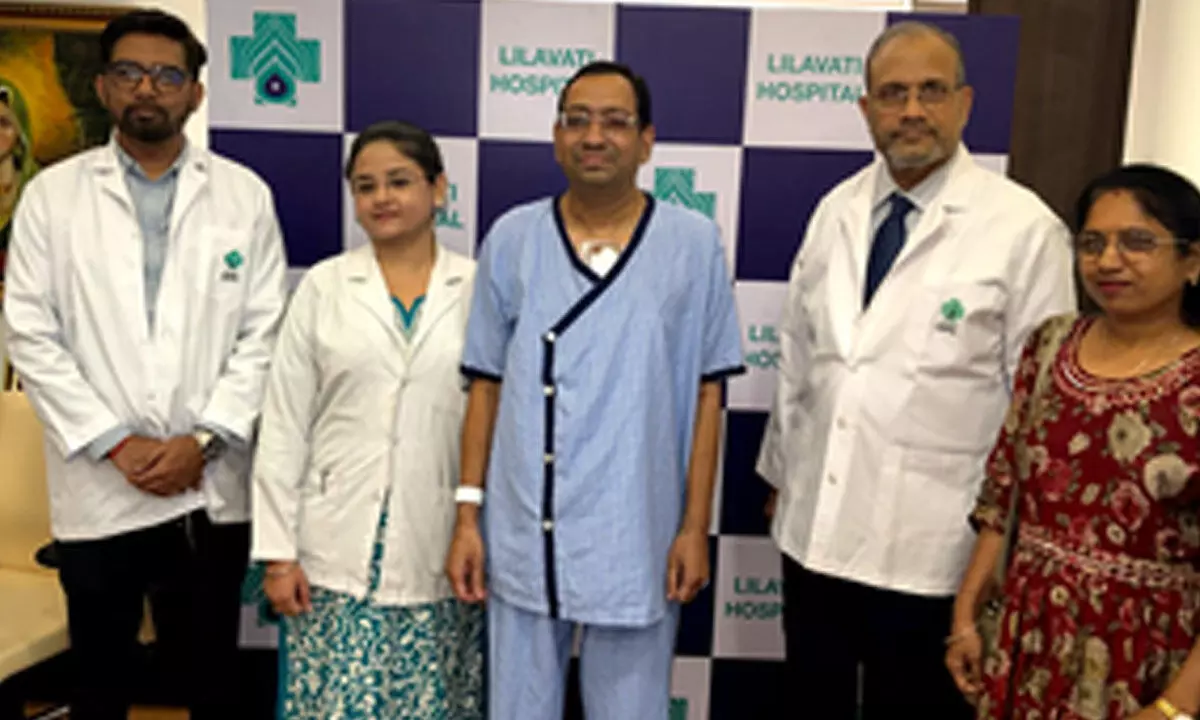Just In
Maha man with rare blood group undergoes successful heart surgery at Lilavati Hospital

In what is being described as a medical breakthrough, the Lilavati Hospital, Mumbai performed a successful complex heart surgery to remove a benign Myxoma tumour in a 50-year-old patient with a rare blood group, officials said here on Friday.
Mumbai: In what is being described as a medical breakthrough, the Lilavati Hospital, Mumbai performed a successful complex heart surgery to remove a benign Myxoma tumour in a 50-year-old patient with a rare blood group, officials said here on Friday.
The patient’s blood group was identified as ‘Gerbich Phenotype’, the first such in India, and owing to this his own blood was collected for the surgery, eliminating the need for an external blood transfusion, said the medical team of Dr. Pavan Kumar and Ruhi Mehra.
The patient, Rajesh Agarwal from Yavatmal, Maharashtra, complained of chest pain and a mass was discovered in his heart, which was later confirmed as a Myxoma tumour within the right atrium of his heart. Apart from this he was suffering from severe triple vessel coronary artery diseases, necessitating a Coronary Artery Bypass Grafting surgery.
The team of Dr. Kumar, Dr. Mehra, Dr. Abhay Bhave, Dr. Nitin Chavan and others used state-of-the-art techniques and innovative approaches to ensure safe removal of the tumour while minimising potential complications associated with the patient’s unique blood group.
“Myxomas are extremely rare tumors that can develop in the heart and disrupt normal cardiac function. However, this case presented an additional challenge due to the patient's Gerbich Phenotype blood group, which is found in less than 0.01 per cent of the Indian population,” explained Dr. Kumar.
The patient underwent blood group testing prior to the operation to arrange for blood transfusion during the surgery and was found to have AB+ Blood Group, which is quite common. “However, his blood was not matching with any of the nearly 50 donor blood units tested (including O-Negative), and further extensive immuno-hematological analysis revealed that the patient possessed an additional rare blood group antibody, posing an unexpected challenge,” said Dr. Kumar.
The blood of even the patient’s mother, three siblings and two sons was tested but none were found compatible, worrying the medical team as Agarwal was slated to undergo a complicated heart surgery that could require blood transfusion during the operation.
Accordingly, Dr. Mehra said to be absolutely sure, a blood sample was sent to the International Blood Group Reference Laboratory, Bristol, United Kingdom. “The IBGRL, UK, confirmed that the patient’s cells had the rare Gerbich Phenotype due to which he had formed a clinically significant anti-Ge2 allo-antibody, and only eight such phenotype donors are registered in the international rare blood group donor registry. This made it likely that Agarwal’s case was the first-of-its-kind in the country,” said Dr. Mehra.
Prior to the surgery, Agarwal’s blood was collected three times over three week before the surgery was performed on October 18 and the operation went off successfully.
Lilavati Hospital COO Lt. Gen. (Dr.) V. Ravishankar said in this case, the multi-disciplinary approach adopted by the hospital proved that such rare cases can also be handled with utmost care to obtain the desired favourable results.
On his part, Agarwal – who is recovering well post-surgery - said he was shocked to discover the series of health problems he was afflicted and then the discovery of the rarest of rare blood group, but expressed his gratitude to the Lilavati Hospital medical team for the successful surgery that has given him a new lease of life.

© 2024 Hyderabad Media House Limited/The Hans India. All rights reserved. Powered by hocalwire.com






